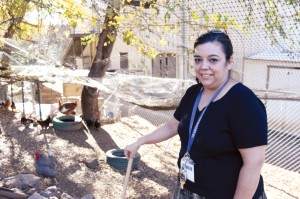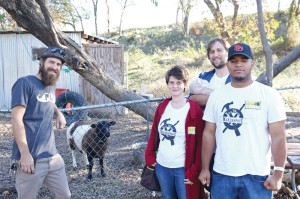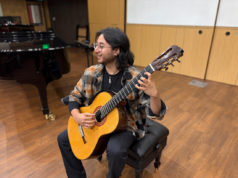
In East Fort Worth, an 11-year-old charter elementary school is making community gardens a core part of its educational mission. East Fort Worth Montessori Academy has 350 students and an unusual recreational area. Instead of jungle gyms and basketball courts, the vast outdoor playgrounds behind the school are covered with carefully tended gardens and fenced-in spaces for chickens, a goat, rabbits, and one sheep.
Each classroom has been assigned its own town garden, said principal Shello Tabb.
Just outside each room’s outward-facing glass wall is a small in-ground bed that contains basil, mint, okra, and rosemary plants. “There’s usually more to look at in early fall and spring,” she admitted.
Farther back, a large field, formerly a soccer pitch, contains eight rows of 20-foot-long elevated gardens and an equal number of in-ground beds on the other side. The raised beds hold large bushels of leafy greens. The gardens are tended and harvested by students under teacher supervision. Most of the produce is consumed by students in the classroom, where they also learn how to properly cut and prepare vegetables, or in the cafeteria. A small portion is sold at makeshift farmers markets on school grounds during fundraising efforts.
James Zametz, founder of Keep Fort Worth Funky, a volunteer movement that supports local artists and independent businesses, and the father of a kindergartener at the academy, said sustainability is not a foreign word at his house.
“I teach my son about sustainability at home, so it’s nice to have that reinforced at school,” he said. “The fact that they have farm animals is awesome. Every school should offer that experience.”
Through a volunteer group, Makerspace Garden Club, Zametz and other volunteers repaired and removed weeds from the school’s gardens to help prepare them for spring last week.
“This is part of the Montessori approach to holistic education,” Tabb said. “To farm is to problem solve. The social interactions needed to farm also teach cooperation and conflict resolution. These are important life skills that are sometimes missed in our test-driven society.”

The academy, Tabb said, has become a learning resource. Last Saturday, students from the University of Texas-Arlington and other sustainable food-minded groups attended a workshop at the school about community gardens, hydroponics, and urban farming. She hopes local public schools will become more involved in sustainable agriculture, which she noted is a great way to teach science.
“We’ve worked hard to network within the community,” she said. “Food sustainability is just one part of creating a sustainable community.”
David Aftandilian, who has been teaching his students at TCU and the community at large about the benefits of urban agriculture since 2008, said he’s seen not only interest but the number of community gardens in Fort Worth grow significantly over the past seven years alone.
As a member of the Food Policy Council, Aftandilian is heading an effort to revamp the city’s zoning ordinances to make them friendlier to community gardens, working with the city’s planning department: “If a community has vacant lots, which a lot of food deserts have, we can turn them into urban agriculture farms, and people can raise food and sell it. But there’s no structure in place for that now.”
Public hearings on his proposals, which would also allow for gardens on public land, will enter the public input phase next spring, he said.
Aftandilian said the gardens could boost economic development in Fort Worth’s poorer communities. Several chefs have told him they would use locally sourced food if there was enough of it.
“Here is an opportunity to have more food grown within our city limits, let people make a living doing that, and support the local foods market,” he said.
But he has sober advice for anyone interested in starting the agricultural venture.
“It takes physical labor,” he said. “And it takes knowledge. I recommend having at least eight people committed to the project before starting.”
The most important word in “community garden,” he said, is “community.” The experience can be a great way to build relationships and utilize individual strengths towards a greater goal.
Tarrant Area Food Bank’s involvement in community gardens has transitioned from creating them to training others how to build and maintain them, Ewen said.
Ridglea Christian Church is now home to the Food Bank’s learning garden. Classes are held weekly.
“You can go there and take classes on anything from soil improvement to how to plant,” she said.
Ewen also oversees a program called Garden on the Go. Every Tuesday, she parks in one of three food deserts (River Oaks Community Center, Joy James Elementary, and First Christian Church of Arlington) and sells $5 tote bags of fresh vegetables and fruits.
The program is one year old, and while it’s still in the experimental phase, it’s generated $15,000 in sales.
“I think I’m demonstrating people really do want good healthy produce,” she said.
She is also demonstrating that people in low-income neighborhoods are willing and able to afford a significant part of the produce’s cost, meaning the program is not wholly dependent on donations. For any bootstrapped nonprofit, those benefits are evident.
“We believe food is a right,” she said. “People are willing to use assets to get good healthy food. It is what they eat if it’s available.”
******
If you engage enough people in a given community, Blue Zones’ Duda said, you can reach a tipping point where big changes can happen: “One of our targets [for Fort Worth] is to get 20 percent of adults to take a personal pledge” to improve their health.
But changing perceptions about the working poor may need to come first.
“There’s a lot of bad information out there,” the Food Bank’s Hynes said. “Most of the people who lack access to healthy food are hard working”
While those preconceptions are difficult and almost impossible at times to fight in Texas’ political climate, she said, at least the public health mindset has improved. Whereas the focus by public officials was on medicine and treatment in past decades, now there’s more conversation on prevention and healthy eating.
Finally, she said, “we’re getting synergy that wasn’t there before.”












Keep up the important work for a healthier Fort Worth, Blue Zones!